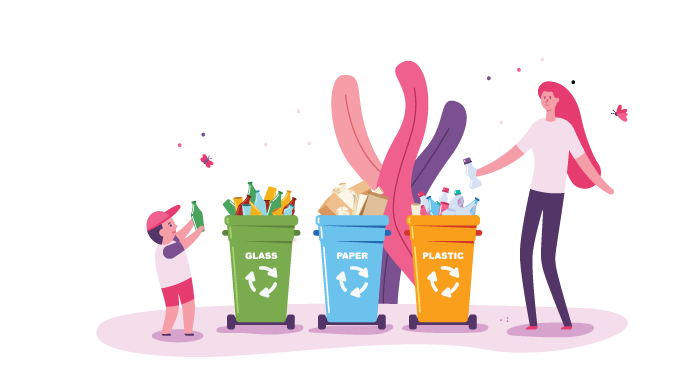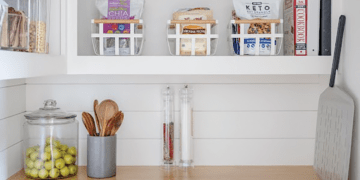During a recent Sunday School class at Rejoice Lutheran Church in West Omaha, the teacher set a pile of trash before a group of curious students. The children—some as young as age 5—ran a relay. Each raced to grab an item, put it in either the trash can or recycle bins, and raced back for more. They raced and sorted, and raced and sorted, and in the end, everyone won. And the trash can? It remained nearly empty.
Omahan Leanne Paetz, a member of the Rejoice congregation and an avid recycler, pitched the activity to the Sunday School coordinator. The lesson taught was valuable: not everything discarded is trash or belongs in the landfill.
Paetz believes getting children involved in recycling teaches them to appreciate and respect the world given to them, and it’s easy to do. It’s also key to developing life-long recyclers. “When they learn it at a young age, it becomes second nature to them.”
Addie Gengenbach, executive director of Green Omaha Coalition, a nonprofit whose mission is to connect the Omaha public with green resources, agreed.
“Kids are an amazing proponent of recycling. They pick it up insanely quick,” Gengenbach said. She mused about the increasing phenomenon of children teaching adults to recycle. “Kids lecture parents about putting stuff in the wrong bins.”
Gengenbach said that no matter how recycling is introduced to kids, the practice is a good opportunity for little ones to contribute to their household and community.
As simple as sorting recyclables is, landfills continue to accumulate tons of items that would be better directed to recycling plants, where they can be repurposed. Gengenbach believes many people simply overcomplicate the task. Most plastic consumables are clearly marked with recycling codes from 1 to 7 denoting their material and status to facilitate sorting and proper disposal. And metro garbage collection services—Wasteline Omaha, Abe’s Trash, and Papillion Sanitation, among them—offer curbside pickup of recycleables, for a fee.
In addition, the Hefty EnergyBag Program allows for the recycling of much non-coded plastic waste, such as candy wrappers and foam takeout containers, or “soft plastics.” Homeowners can purchase a roll of EnergyBags (available at Hy-Vee, Home Depot, Menards, Family Fare, and other retailers locally), fill bags with those plastics, and toss them into their recycling bins along with cardboard, paper, tin and aluminum cans, and coded plastics.
Gengenbach said plastic bags, toothpaste tubes, foam egg cartons, plastic straws, and food packaging all qualify for the EnergyBag. The refuse is recycled into plastic decking, building materials, and even diesel fuel.
Paetz stressed that functionality is key to building better recycling
habits. For instance, she places an attractive recycling bin at the end of her kitchen counter for easy access. “It doesn’t look ugly…It just looks like a nice wicker basket.” And it saves her dozens of trips to the garage bin. Convenience is everything.
Keeping glass out of the garbage requires an extra sorting bin, but that shouldn’t dissuade anyone. Though curbside glass pickup is not available in the metro, the City of Omaha provides several free glass disposal sites, listed at wasteline.org. (Wasteline also provides destinations for recycling appliances/electronics.)
Recycling can and should be easy, and makes one more aware of the volume of waste each produces. Paetz said the practice typically makes consumers far more conscious of how much they buy as well. Everything bought will one day be discarded, thus impermanence is another valuable lesson.
So, if you’re not a recycler already, walk to the trash can and look inside. It’s a safe bet there’s less true trash in there than recyclables. Make a commitment to reducing your landfill waste this year. Get a second bin and start sorting. Or better yet, get the kids involved…host a relay.
This article originally appeared in the March/April 2022 issue of Omaha Home. To receive the magazine, click here to subscribe.













